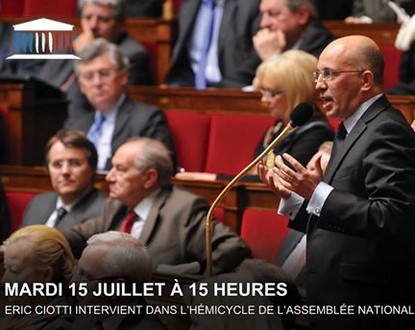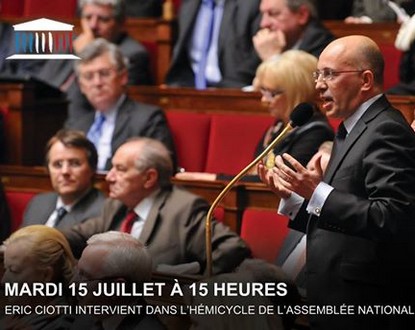The Parliament has definitively adopted the penal reform of the Minister of Justice, Christiane Taubira.
 While the Justice Minister welcomed the adoption of this “law for the protection of society, as at the heart of the social contract lies the duty of protection that the State owes to the citizen,” Eric Ciotti, who has made security issues his business and is responsible for them within the UMP, denounced it as a form of “legal impunity.”
While the Justice Minister welcomed the adoption of this “law for the protection of society, as at the heart of the social contract lies the duty of protection that the State owes to the citizen,” Eric Ciotti, who has made security issues his business and is responsible for them within the UMP, denounced it as a form of “legal impunity.”
Remarks expressed in the National Assembly chamber and repeated during a meeting with activists yesterday afternoon: “the price to pay for the French will be heavy: a weakened justice and degraded security.”
Moreover, the content of this law set two opposing conceptions of justice against each other: on one side, the supporters of “law & order” with the principle, inherited from the law of retaliation and punishment, and on the other, those who believe that minor crimes can allow for the rehabilitation of the guilty and their reintegration into society, hence the adaptation of the sentence.
These definitions are admittedly simplistic, but they clearly convey the idea of the socio-cultural difference of each trend before being political: Two visions of society organization confront each other, and each can provide reasons supporting its thesis.
Eric Ciotti’s criticisms reflect this. By accusing Christiane Taubira of wanting “a penal policy based on the number of prison places, whereas the opposite should be done,” the Nice deputy indirectly indicates the alternative solution: Building more prisons.
Setting aside the (marginal?) fact that, when talked about, the first reaction of elected officials and residents of an identified site is to rebel, as was recently the case in Saint-Laurent du Var, the question remains: Is this the solution?
The example, on a large scale of the United States, where nearly 2.3 million inmates are listed, does not go in this direction. Similarly, it is not proven that a lighter sentence and a rehabilitation follow-up suffice to transform a criminal into an exemplary citizen, especially if objectives are not pursued with sufficient resources.
In the end, personal convictions or political positions at stake, everyone can claim their formula is the right one, with no one able to contradict it. The topic is sensitive, and everyone will draw the conclusions they deem best.
As for the law, what are the new features?…
Minimum sentences for repeat offenders are abolished. Created in 2007, during Nicolas Sarkozy’s presidency, this measure required judges to pronounce the sentence provided by law, without the possibility of imposing a lesser sentence, in case of recurrence. However, judges could avoid them by specifically motivating their decision, which they did more and more frequently.
A new sentence is created: “penal constraint.” It will be carried out in open setting. Under judicial control, the convict must comply with obligations and prohibitions. The idea is to promote reintegration and prevent recidivism. This sentence can be pronounced for all offenses starting from January 1, 2017, and as of January 1, 2015, for those punishable by a maximum of five years in prison. According to the impact study, 8,000 to 20,000 penal constraints should be pronounced each year.
“Dry” releases from prison, that is, without accompanying measures, currently represent 80% of releases, even 98% for sentences of less than six months. The reform thus provides for an evaluation of prisoners at two-thirds of the sentence. Depending on the journey and the reintegration project, a “release under constraint” can be decided by the sentence enforcement judge, with restriction, obligation, and supervision measures. The text also provides that victims may request to be informed of the end of a prison sentence.
When the court has pronounced guilt and compensation measures for the victims, it can then defer its decision on the sentence to a second hearing, in order to obtain more information on the personality and situation of the author. This second hearing must be held within a maximum period of four months, or two months in case of pre-trial detention.


